Business Strategies Assignment - Business Continuity Plan
VerifiedAdded on 2022/10/18
|8
|1223
|423
Homework Assignment
AI Summary
This assignment explores various facets of business strategies, focusing on key areas such as organizational cultural profiles, business continuity strategies, and governance structures. It delves into the importance of employee empowerment, expectation management, and the role of the board of directors. The assignment also covers the implementation of business continuity management frameworks, including the roles of key personnel like the COO and CFO. Furthermore, it examines management systems, the continual improvement process using the PDCA cycle, and tools for measuring benchmarks such as performance appraisals. The development of effective communication plans, principles of risk management, and the significance of communication strategies within an organization are also discussed. Finally, it highlights how governance structures help resolve conflicts of interest, providing a comprehensive overview of strategic business practices.

Business Strategies 0
Title: Business Strategies
Assignment Name:
Student Name:
Professor:
Date:
Title: Business Strategies
Assignment Name:
Student Name:
Professor:
Date:
Paraphrase This Document
Need a fresh take? Get an instant paraphrase of this document with our AI Paraphraser
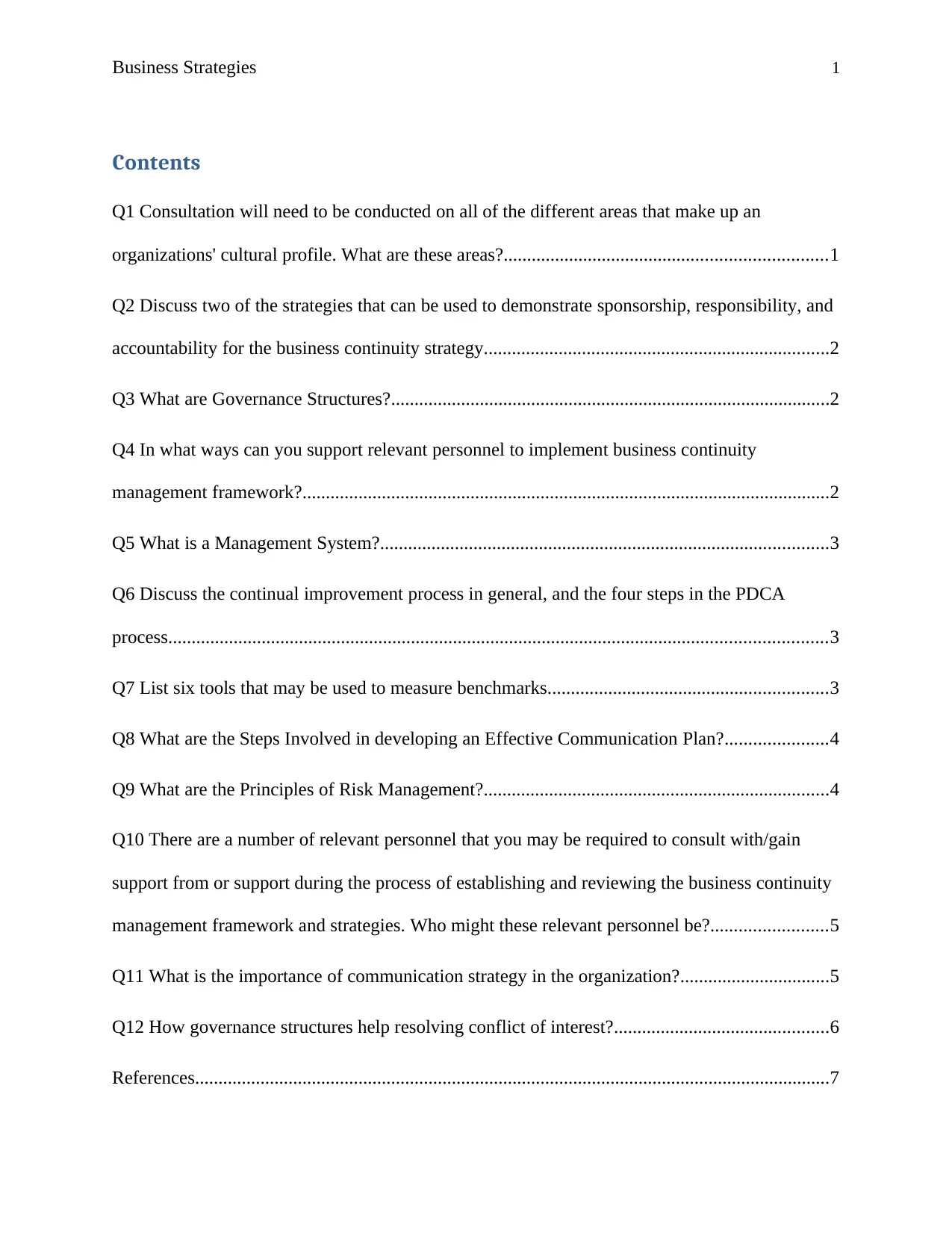
Business Strategies 1
Contents
Q1 Consultation will need to be conducted on all of the different areas that make up an
organizations' cultural profile. What are these areas?.....................................................................1
Q2 Discuss two of the strategies that can be used to demonstrate sponsorship, responsibility, and
accountability for the business continuity strategy..........................................................................2
Q3 What are Governance Structures?..............................................................................................2
Q4 In what ways can you support relevant personnel to implement business continuity
management framework?.................................................................................................................2
Q5 What is a Management System?................................................................................................3
Q6 Discuss the continual improvement process in general, and the four steps in the PDCA
process.............................................................................................................................................3
Q7 List six tools that may be used to measure benchmarks............................................................3
Q8 What are the Steps Involved in developing an Effective Communication Plan?......................4
Q9 What are the Principles of Risk Management?..........................................................................4
Q10 There are a number of relevant personnel that you may be required to consult with/gain
support from or support during the process of establishing and reviewing the business continuity
management framework and strategies. Who might these relevant personnel be?.........................5
Q11 What is the importance of communication strategy in the organization?................................5
Q12 How governance structures help resolving conflict of interest?..............................................6
References........................................................................................................................................7
Contents
Q1 Consultation will need to be conducted on all of the different areas that make up an
organizations' cultural profile. What are these areas?.....................................................................1
Q2 Discuss two of the strategies that can be used to demonstrate sponsorship, responsibility, and
accountability for the business continuity strategy..........................................................................2
Q3 What are Governance Structures?..............................................................................................2
Q4 In what ways can you support relevant personnel to implement business continuity
management framework?.................................................................................................................2
Q5 What is a Management System?................................................................................................3
Q6 Discuss the continual improvement process in general, and the four steps in the PDCA
process.............................................................................................................................................3
Q7 List six tools that may be used to measure benchmarks............................................................3
Q8 What are the Steps Involved in developing an Effective Communication Plan?......................4
Q9 What are the Principles of Risk Management?..........................................................................4
Q10 There are a number of relevant personnel that you may be required to consult with/gain
support from or support during the process of establishing and reviewing the business continuity
management framework and strategies. Who might these relevant personnel be?.........................5
Q11 What is the importance of communication strategy in the organization?................................5
Q12 How governance structures help resolving conflict of interest?..............................................6
References........................................................................................................................................7
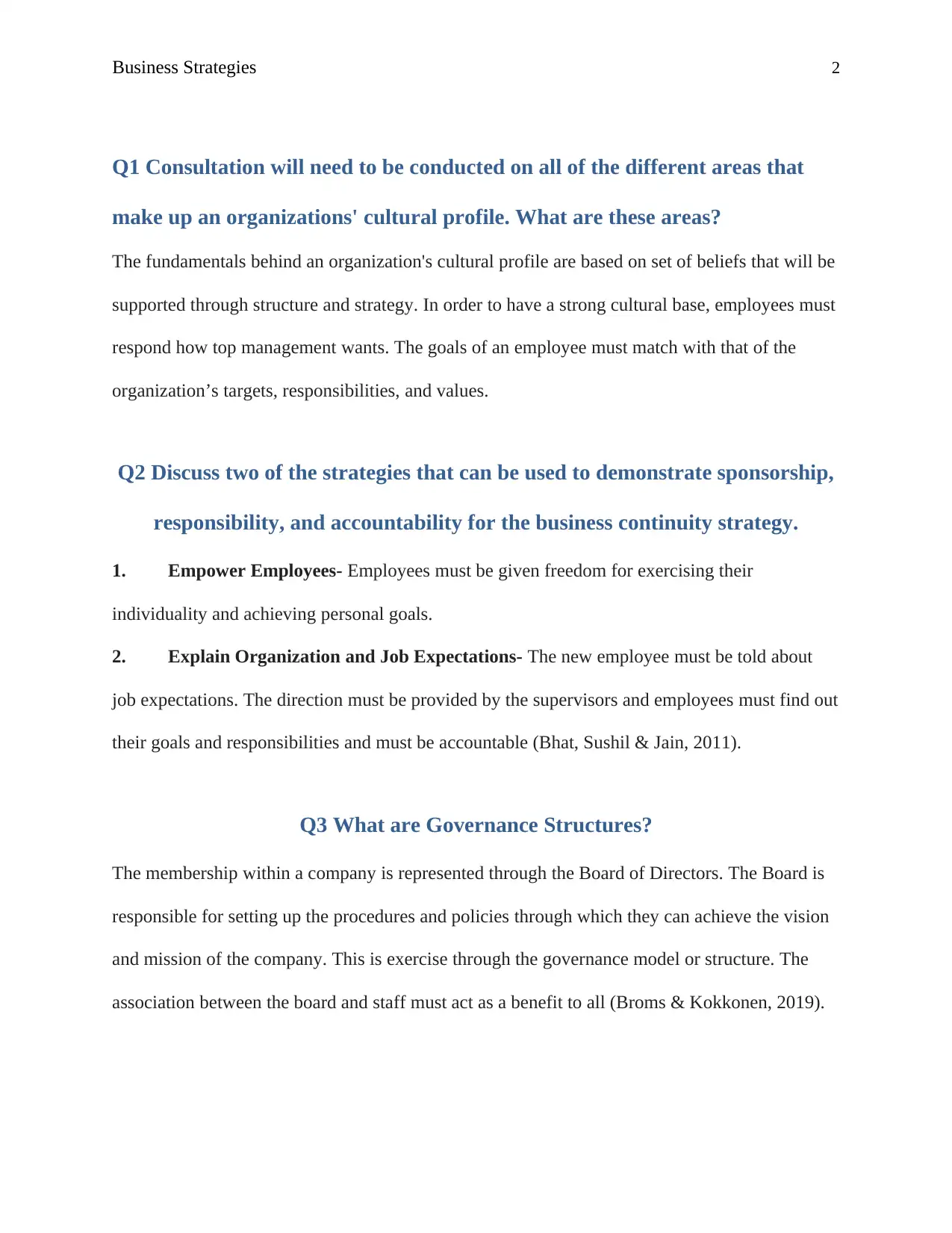
Business Strategies 2
Q1 Consultation will need to be conducted on all of the different areas that
make up an organizations' cultural profile. What are these areas?
The fundamentals behind an organization's cultural profile are based on set of beliefs that will be
supported through structure and strategy. In order to have a strong cultural base, employees must
respond how top management wants. The goals of an employee must match with that of the
organization’s targets, responsibilities, and values.
Q2 Discuss two of the strategies that can be used to demonstrate sponsorship,
responsibility, and accountability for the business continuity strategy.
1. Empower Employees- Employees must be given freedom for exercising their
individuality and achieving personal goals.
2. Explain Organization and Job Expectations- The new employee must be told about
job expectations. The direction must be provided by the supervisors and employees must find out
their goals and responsibilities and must be accountable (Bhat, Sushil & Jain, 2011).
Q3 What are Governance Structures?
The membership within a company is represented through the Board of Directors. The Board is
responsible for setting up the procedures and policies through which they can achieve the vision
and mission of the company. This is exercise through the governance model or structure. The
association between the board and staff must act as a benefit to all (Broms & Kokkonen, 2019).
Q1 Consultation will need to be conducted on all of the different areas that
make up an organizations' cultural profile. What are these areas?
The fundamentals behind an organization's cultural profile are based on set of beliefs that will be
supported through structure and strategy. In order to have a strong cultural base, employees must
respond how top management wants. The goals of an employee must match with that of the
organization’s targets, responsibilities, and values.
Q2 Discuss two of the strategies that can be used to demonstrate sponsorship,
responsibility, and accountability for the business continuity strategy.
1. Empower Employees- Employees must be given freedom for exercising their
individuality and achieving personal goals.
2. Explain Organization and Job Expectations- The new employee must be told about
job expectations. The direction must be provided by the supervisors and employees must find out
their goals and responsibilities and must be accountable (Bhat, Sushil & Jain, 2011).
Q3 What are Governance Structures?
The membership within a company is represented through the Board of Directors. The Board is
responsible for setting up the procedures and policies through which they can achieve the vision
and mission of the company. This is exercise through the governance model or structure. The
association between the board and staff must act as a benefit to all (Broms & Kokkonen, 2019).
⊘ This is a preview!⊘
Do you want full access?
Subscribe today to unlock all pages.

Trusted by 1+ million students worldwide
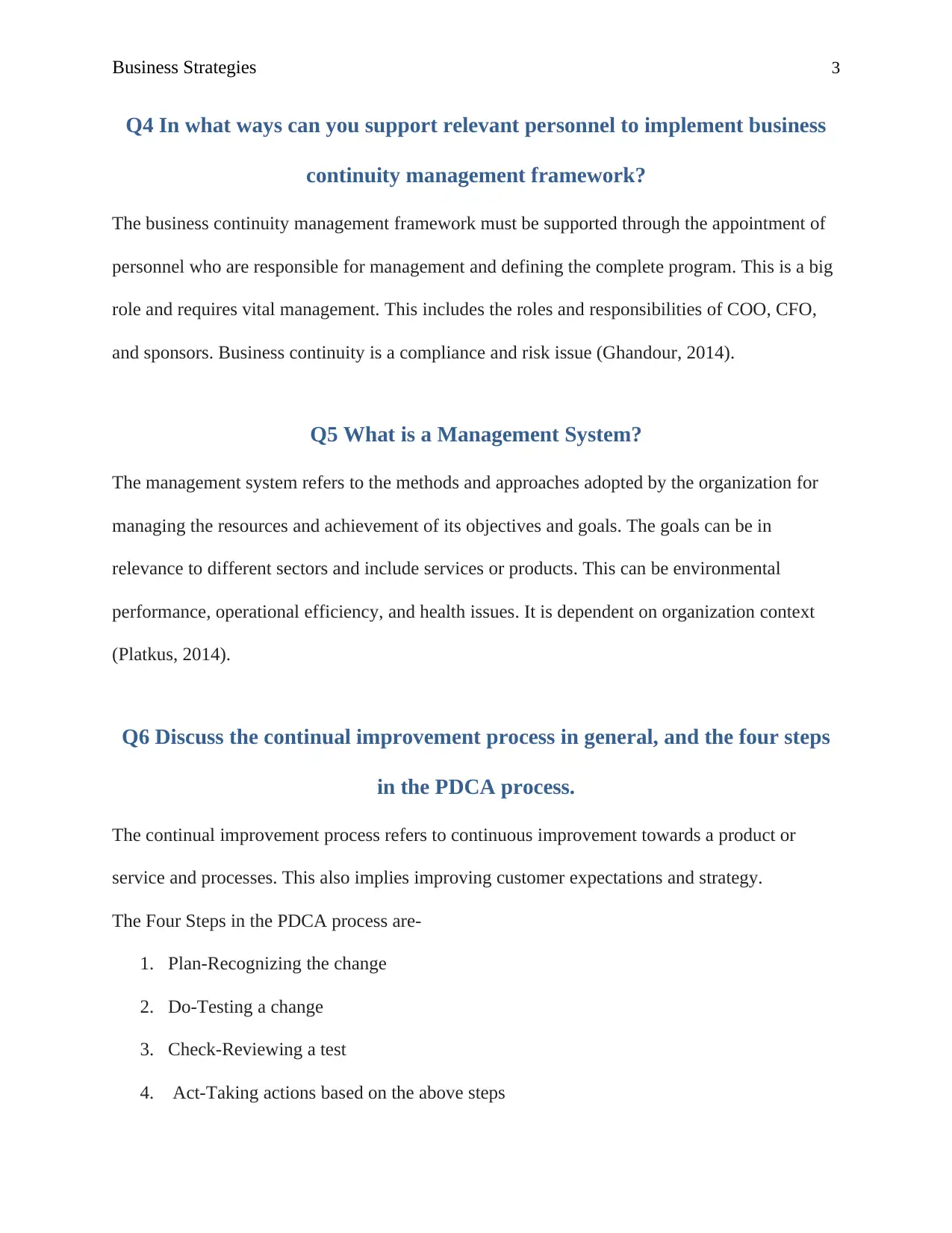
Business Strategies 3
Q4 In what ways can you support relevant personnel to implement business
continuity management framework?
The business continuity management framework must be supported through the appointment of
personnel who are responsible for management and defining the complete program. This is a big
role and requires vital management. This includes the roles and responsibilities of COO, CFO,
and sponsors. Business continuity is a compliance and risk issue (Ghandour, 2014).
Q5 What is a Management System?
The management system refers to the methods and approaches adopted by the organization for
managing the resources and achievement of its objectives and goals. The goals can be in
relevance to different sectors and include services or products. This can be environmental
performance, operational efficiency, and health issues. It is dependent on organization context
(Platkus, 2014).
Q6 Discuss the continual improvement process in general, and the four steps
in the PDCA process.
The continual improvement process refers to continuous improvement towards a product or
service and processes. This also implies improving customer expectations and strategy.
The Four Steps in the PDCA process are-
1. Plan-Recognizing the change
2. Do-Testing a change
3. Check-Reviewing a test
4. Act-Taking actions based on the above steps
Q4 In what ways can you support relevant personnel to implement business
continuity management framework?
The business continuity management framework must be supported through the appointment of
personnel who are responsible for management and defining the complete program. This is a big
role and requires vital management. This includes the roles and responsibilities of COO, CFO,
and sponsors. Business continuity is a compliance and risk issue (Ghandour, 2014).
Q5 What is a Management System?
The management system refers to the methods and approaches adopted by the organization for
managing the resources and achievement of its objectives and goals. The goals can be in
relevance to different sectors and include services or products. This can be environmental
performance, operational efficiency, and health issues. It is dependent on organization context
(Platkus, 2014).
Q6 Discuss the continual improvement process in general, and the four steps
in the PDCA process.
The continual improvement process refers to continuous improvement towards a product or
service and processes. This also implies improving customer expectations and strategy.
The Four Steps in the PDCA process are-
1. Plan-Recognizing the change
2. Do-Testing a change
3. Check-Reviewing a test
4. Act-Taking actions based on the above steps
Paraphrase This Document
Need a fresh take? Get an instant paraphrase of this document with our AI Paraphraser
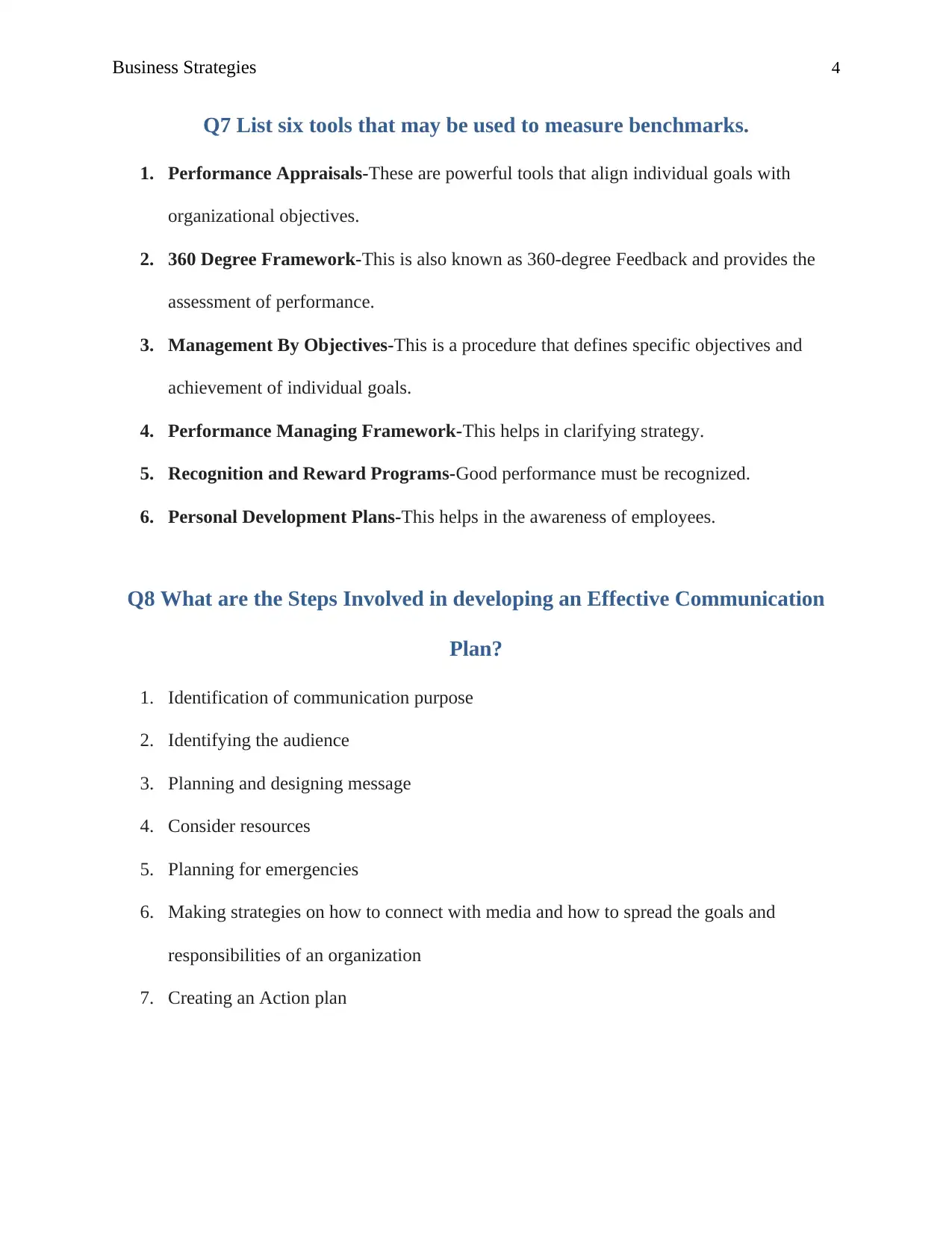
Business Strategies 4
Q7 List six tools that may be used to measure benchmarks.
1. Performance Appraisals-These are powerful tools that align individual goals with
organizational objectives.
2. 360 Degree Framework-This is also known as 360-degree Feedback and provides the
assessment of performance.
3. Management By Objectives-This is a procedure that defines specific objectives and
achievement of individual goals.
4. Performance Managing Framework-This helps in clarifying strategy.
5. Recognition and Reward Programs-Good performance must be recognized.
6. Personal Development Plans-This helps in the awareness of employees.
Q8 What are the Steps Involved in developing an Effective Communication
Plan?
1. Identification of communication purpose
2. Identifying the audience
3. Planning and designing message
4. Consider resources
5. Planning for emergencies
6. Making strategies on how to connect with media and how to spread the goals and
responsibilities of an organization
7. Creating an Action plan
Q7 List six tools that may be used to measure benchmarks.
1. Performance Appraisals-These are powerful tools that align individual goals with
organizational objectives.
2. 360 Degree Framework-This is also known as 360-degree Feedback and provides the
assessment of performance.
3. Management By Objectives-This is a procedure that defines specific objectives and
achievement of individual goals.
4. Performance Managing Framework-This helps in clarifying strategy.
5. Recognition and Reward Programs-Good performance must be recognized.
6. Personal Development Plans-This helps in the awareness of employees.
Q8 What are the Steps Involved in developing an Effective Communication
Plan?
1. Identification of communication purpose
2. Identifying the audience
3. Planning and designing message
4. Consider resources
5. Planning for emergencies
6. Making strategies on how to connect with media and how to spread the goals and
responsibilities of an organization
7. Creating an Action plan
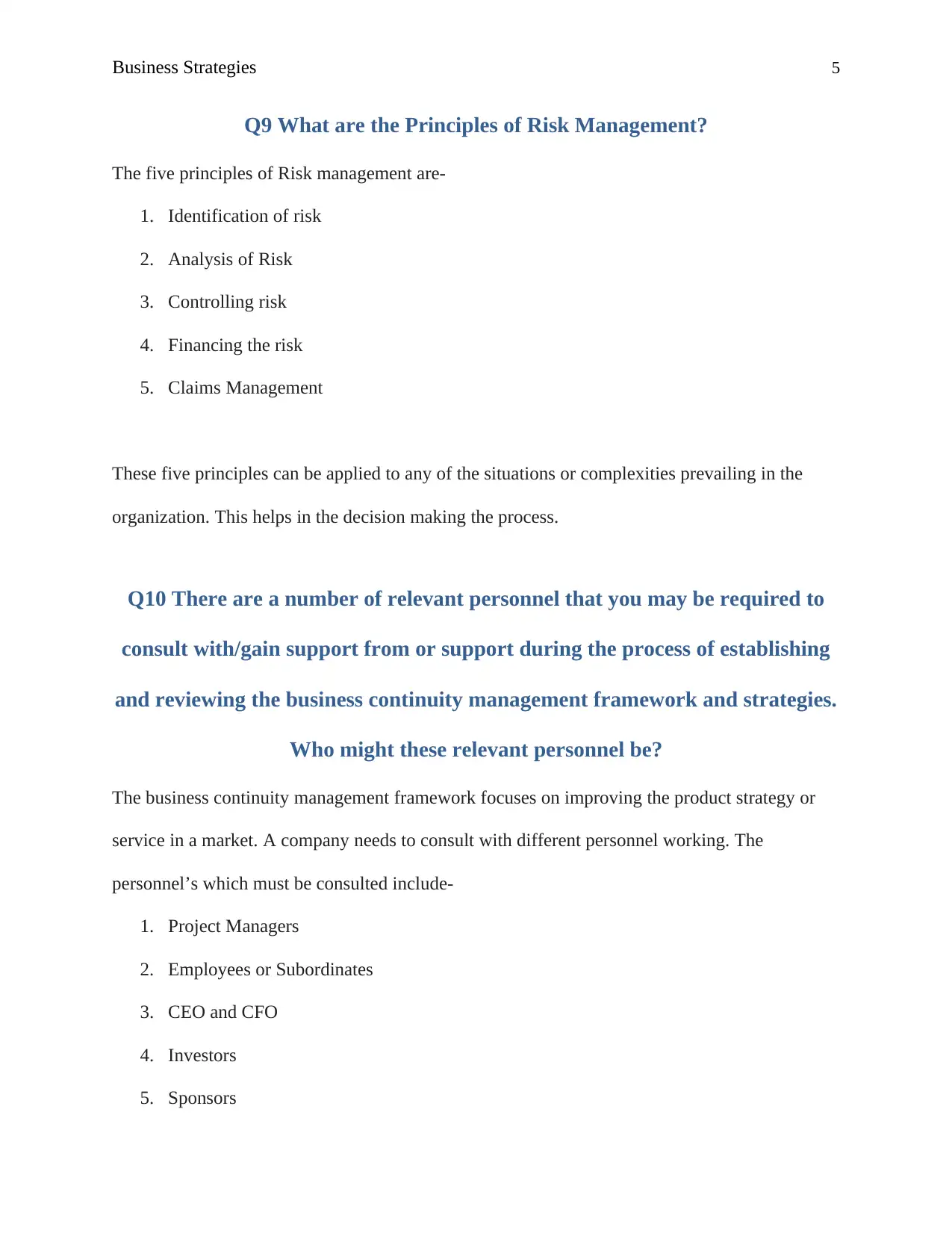
Business Strategies 5
Q9 What are the Principles of Risk Management?
The five principles of Risk management are-
1. Identification of risk
2. Analysis of Risk
3. Controlling risk
4. Financing the risk
5. Claims Management
These five principles can be applied to any of the situations or complexities prevailing in the
organization. This helps in the decision making the process.
Q10 There are a number of relevant personnel that you may be required to
consult with/gain support from or support during the process of establishing
and reviewing the business continuity management framework and strategies.
Who might these relevant personnel be?
The business continuity management framework focuses on improving the product strategy or
service in a market. A company needs to consult with different personnel working. The
personnel’s which must be consulted include-
1. Project Managers
2. Employees or Subordinates
3. CEO and CFO
4. Investors
5. Sponsors
Q9 What are the Principles of Risk Management?
The five principles of Risk management are-
1. Identification of risk
2. Analysis of Risk
3. Controlling risk
4. Financing the risk
5. Claims Management
These five principles can be applied to any of the situations or complexities prevailing in the
organization. This helps in the decision making the process.
Q10 There are a number of relevant personnel that you may be required to
consult with/gain support from or support during the process of establishing
and reviewing the business continuity management framework and strategies.
Who might these relevant personnel be?
The business continuity management framework focuses on improving the product strategy or
service in a market. A company needs to consult with different personnel working. The
personnel’s which must be consulted include-
1. Project Managers
2. Employees or Subordinates
3. CEO and CFO
4. Investors
5. Sponsors
⊘ This is a preview!⊘
Do you want full access?
Subscribe today to unlock all pages.

Trusted by 1+ million students worldwide
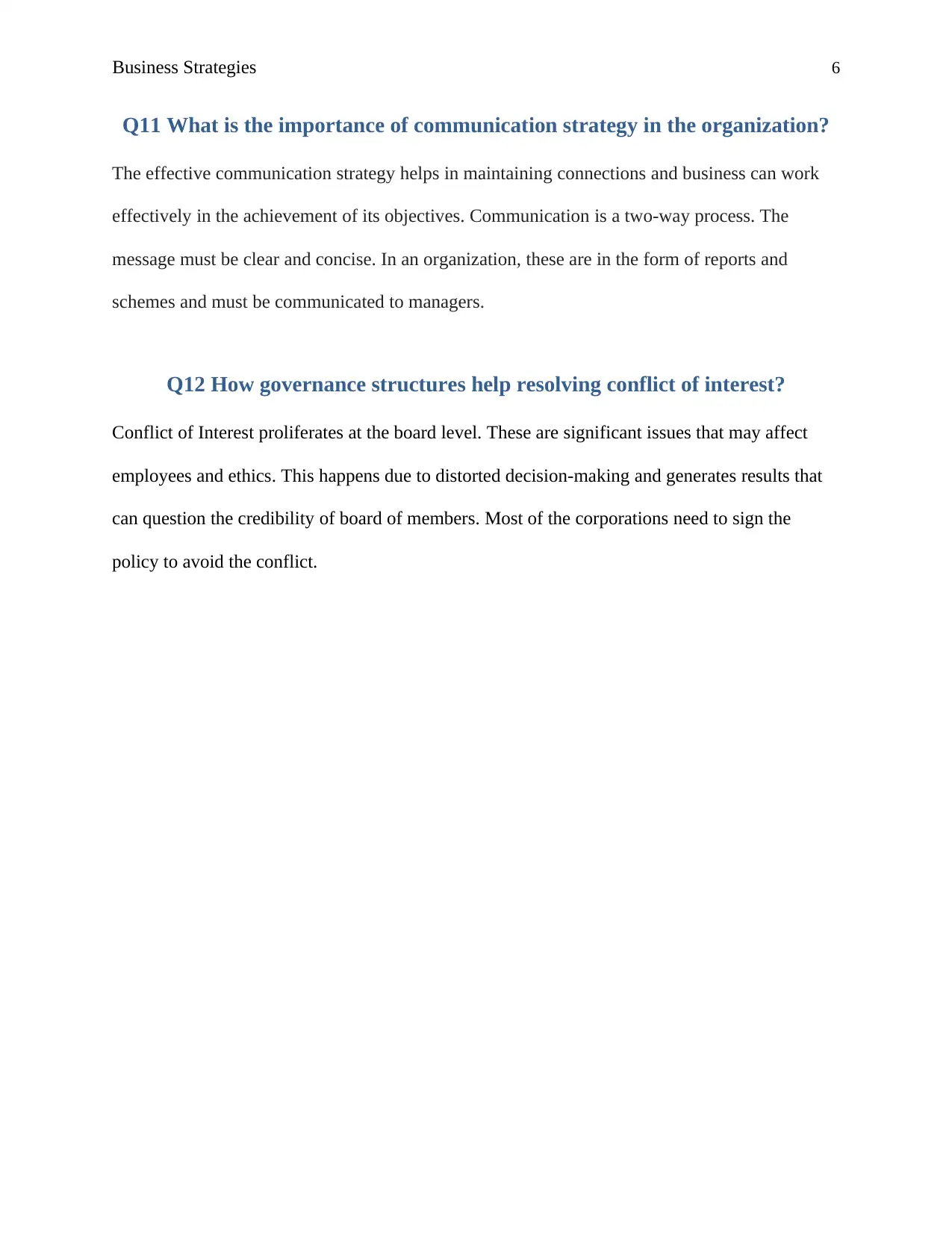
Business Strategies 6
Q11 What is the importance of communication strategy in the organization?
The effective communication strategy helps in maintaining connections and business can work
effectively in the achievement of its objectives. Communication is a two-way process. The
message must be clear and concise. In an organization, these are in the form of reports and
schemes and must be communicated to managers.
Q12 How governance structures help resolving conflict of interest?
Conflict of Interest proliferates at the board level. These are significant issues that may affect
employees and ethics. This happens due to distorted decision-making and generates results that
can question the credibility of board of members. Most of the corporations need to sign the
policy to avoid the conflict.
Q11 What is the importance of communication strategy in the organization?
The effective communication strategy helps in maintaining connections and business can work
effectively in the achievement of its objectives. Communication is a two-way process. The
message must be clear and concise. In an organization, these are in the form of reports and
schemes and must be communicated to managers.
Q12 How governance structures help resolving conflict of interest?
Conflict of Interest proliferates at the board level. These are significant issues that may affect
employees and ethics. This happens due to distorted decision-making and generates results that
can question the credibility of board of members. Most of the corporations need to sign the
policy to avoid the conflict.
Paraphrase This Document
Need a fresh take? Get an instant paraphrase of this document with our AI Paraphraser
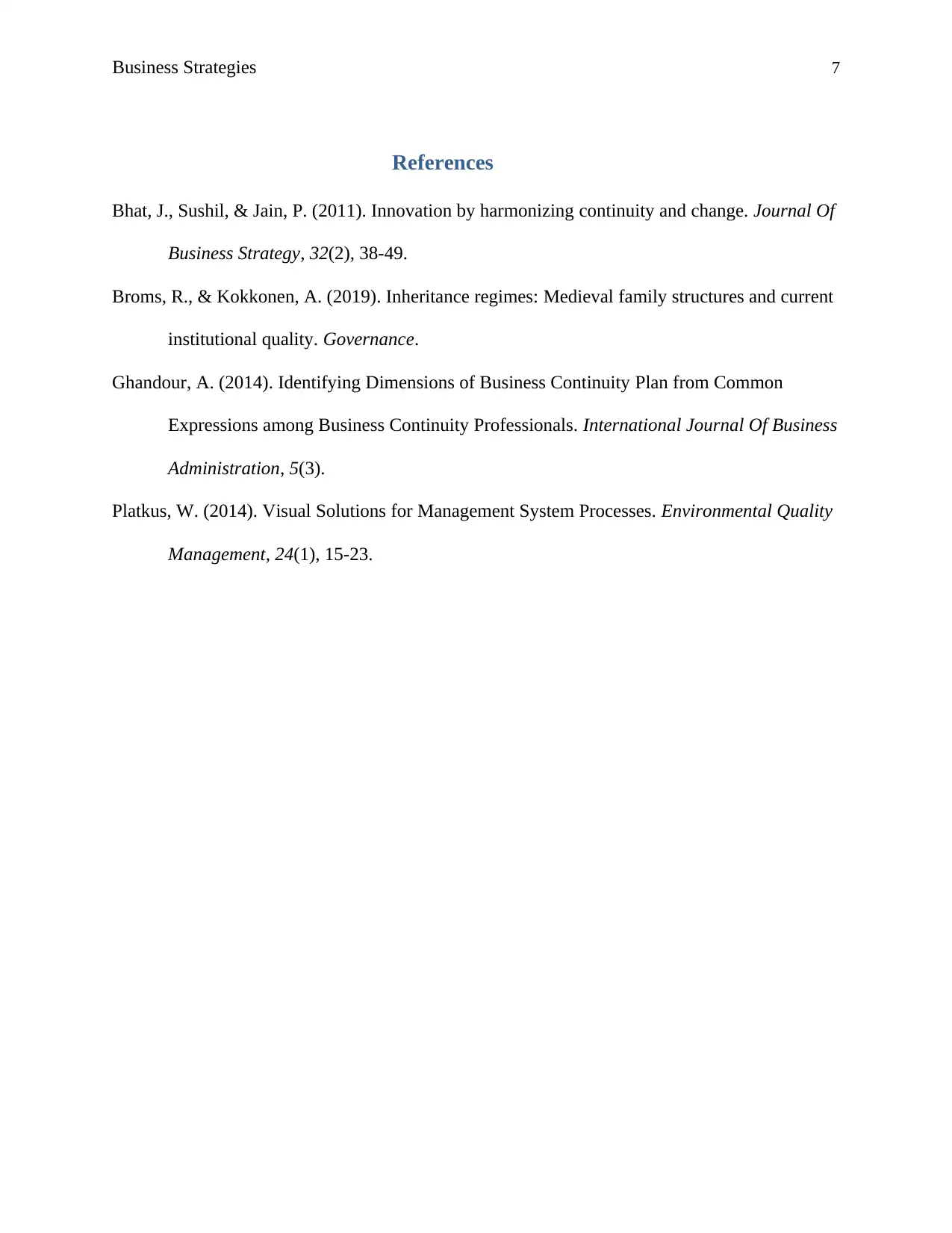
Business Strategies 7
References
Bhat, J., Sushil, & Jain, P. (2011). Innovation by harmonizing continuity and change. Journal Of
Business Strategy, 32(2), 38-49.
Broms, R., & Kokkonen, A. (2019). Inheritance regimes: Medieval family structures and current
institutional quality. Governance.
Ghandour, A. (2014). Identifying Dimensions of Business Continuity Plan from Common
Expressions among Business Continuity Professionals. International Journal Of Business
Administration, 5(3).
Platkus, W. (2014). Visual Solutions for Management System Processes. Environmental Quality
Management, 24(1), 15-23.
References
Bhat, J., Sushil, & Jain, P. (2011). Innovation by harmonizing continuity and change. Journal Of
Business Strategy, 32(2), 38-49.
Broms, R., & Kokkonen, A. (2019). Inheritance regimes: Medieval family structures and current
institutional quality. Governance.
Ghandour, A. (2014). Identifying Dimensions of Business Continuity Plan from Common
Expressions among Business Continuity Professionals. International Journal Of Business
Administration, 5(3).
Platkus, W. (2014). Visual Solutions for Management System Processes. Environmental Quality
Management, 24(1), 15-23.
1 out of 8
Related Documents
Your All-in-One AI-Powered Toolkit for Academic Success.
+13062052269
info@desklib.com
Available 24*7 on WhatsApp / Email
![[object Object]](/_next/static/media/star-bottom.7253800d.svg)
Unlock your academic potential
Copyright © 2020–2026 A2Z Services. All Rights Reserved. Developed and managed by ZUCOL.





